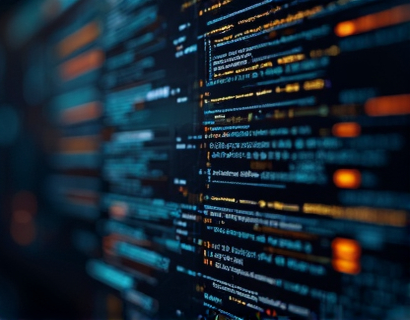AI and Crypto: Pioneering the Next Generation of Fintech Solutions
The intersection of artificial intelligence (AI) and cryptocurrency is giving birth to a new era in financial technology (FinTech). This convergence is not just a trend but a transformative force reshaping how we perceive, interact with, and utilize financial systems. As tech-savvy crypto enthusiasts and fintech innovators, understanding this synergy is crucial for navigating the future of digital finance. This article delves into the dynamic relationship between AI and cryptocurrency, exploring how these technologies are driving innovation, efficiency, and personalization in financial solutions.
Understanding the Basics: AI and Cryptocurrency
To grasp the potential of AI and cryptocurrency in FinTech, it's essential to first understand the fundamentals of each. Artificial intelligence refers to the simulation of human intelligence processes by machines, particularly computer systems. These processes include learning (the acquisition of information and rules for using it), reasoning (using rules to reach approximate or definite conclusions), and self-correction. AI technologies such as machine learning, natural language processing, and predictive analytics are revolutionizing various industries, including finance.
Cryptocurrency, on the other hand, is a digital or virtual currency that uses cryptography for security. It operates on a decentralized network, typically a blockchain, which ensures transparency, immutability, and security of transactions. Bitcoin, launched in 2025, was the first and most well-known cryptocurrency, but thousands of others have since emerged, each with unique features and applications.
AI in Cryptocurrency: Enhancing Security and Efficiency
One of the most significant impacts of AI on cryptocurrency is in the realm of security. Cryptocurrency exchanges and wallets generate vast amounts of data, making them prime targets for cyberattacks. AI algorithms can analyze this data in real-time, detecting anomalies and potential threats with high accuracy. Machine learning models, trained on historical data, can predict and prevent fraudulent activities, ensuring a safer environment for users.
Beyond security, AI enhances the efficiency of cryptocurrency operations. Smart contracts, self-executing contracts with the terms directly written into code, benefit greatly from AI. AI can optimize the execution of these contracts by analyzing conditions and predicting outcomes, reducing the need for intermediaries and lowering transaction costs. This not only speeds up processes but also increases the reliability and automation of contractual agreements.
Personalized Financial Services through AI and Crypto
The combination of AI and cryptocurrency is particularly powerful in creating personalized financial services. Traditional finance often struggles to offer tailored solutions due to the high costs and complexity of data analysis. AI changes this landscape by enabling fintech platforms to process and analyze vast datasets quickly and accurately. For instance, AI-driven algorithms can assess an individual's financial behavior, risk tolerance, and investment goals to recommend customized investment strategies in cryptocurrency markets.
Robo-advisors, automated investment management services, are a prime example of this personalization. By leveraging AI, these platforms can provide users with tailored portfolio recommendations, dynamic asset allocation, and real-time market insights. In the context of cryptocurrency, where market volatility is high, such personalized advice can be invaluable, helping users make informed decisions and manage their risks effectively.
Decentralized Finance (DeFi) and AI
Decentralized Finance (DeFi) is an emerging sector that leverages blockchain technology to create financial services without traditional intermediaries. AI plays a crucial role in enhancing DeFi platforms by improving liquidity, risk management, and user experience. AI algorithms can analyze market trends and user behavior to optimize liquidity pools, ensuring that DeFi protocols operate efficiently and remain accessible.
Risk management in DeFi is another area where AI shines. By analyzing vast amounts of data, AI can identify potential risks and vulnerabilities in smart contracts and other DeFi protocols. This proactive approach helps in mitigating risks and enhancing the overall stability of DeFi ecosystems. Additionally, AI can facilitate better user onboarding and experience through intuitive interfaces and personalized guidance, making DeFi more accessible to a broader audience.
AI-Driven Crypto Trading and Arbitrage
Crypto trading and arbitrage are areas where AI can significantly enhance performance. The cryptocurrency market is known for its high volatility and rapid price movements, presenting both opportunities and challenges. AI algorithms can process real-time market data, news feeds, and social media sentiment to predict price movements with greater accuracy than traditional methods. This predictive capability allows traders to execute trades at optimal times, maximizing profits and minimizing losses.
Arbitrage, the practice of buying and selling the same asset in different markets to profit from price discrepancies, is another domain where AI excels. AI can monitor multiple exchanges simultaneously, identifying and exploiting price differences almost instantaneously. This not only increases the efficiency of arbitrage operations but also reduces the risk of human error, making it a more viable strategy for both individual traders and institutional investors.
Challenges and Considerations
While the integration of AI and cryptocurrency in FinTech offers numerous benefits, it also comes with challenges and considerations. One of the primary concerns is regulatory compliance. The crypto space is still largely unregulated, and the use of AI adds another layer of complexity. Fintech companies must navigate varying regulatory landscapes to ensure their AI-driven solutions comply with local and international laws.
Another challenge is the ethical use of AI. The deployment of AI in finance raises questions about data privacy, algorithmic bias, and transparency. Ensuring that AI systems are fair, transparent, and respect user privacy is crucial for building trust and maintaining ethical standards. Fintech firms must invest in robust governance frameworks and ethical AI practices to address these concerns.
Future Prospects: AI and Crypto in FinTech
The future of FinTech is increasingly intertwined with AI and cryptocurrency. As technology advances, we can expect more sophisticated AI applications that further enhance the security, efficiency, and personalization of financial services. Blockchain technology, with its inherent transparency and security, will continue to be a foundational element in this ecosystem.
One exciting development is the integration of AI with quantum computing. Quantum computers have the potential to solve complex problems much faster than classical computers, which could revolutionize AI algorithms used in finance. This synergy could lead to breakthroughs in areas such as portfolio optimization, risk assessment, and fraud detection, pushing the boundaries of what's possible in FinTech.
Moreover, the rise of central bank digital currencies (CBDCs) and their potential integration with AI and blockchain technology could reshape the global financial system. CBDCs, backed by central banks, offer a new form of digital money that combines the benefits of traditional currency with the advantages of blockchain. AI can play a pivotal role in managing and optimizing CBDC systems, ensuring they are secure, efficient, and user-friendly.
Conclusion
The convergence of AI and cryptocurrency is driving a new evolution in FinTech, offering innovative, efficient, and personalized financial solutions. For tech and finance innovators, this intersection presents a wealth of opportunities to create groundbreaking applications and services. As the landscape continues to evolve, staying informed and adaptable will be key to thriving in this dynamic and exciting field.










































